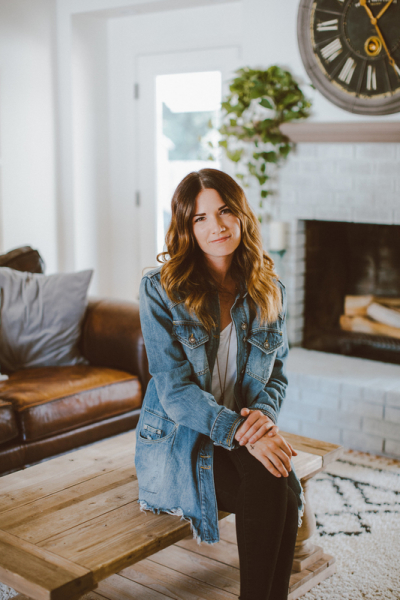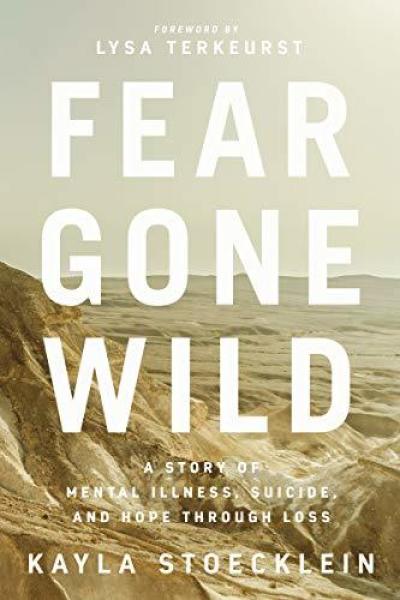Wife of pastor who died by suicide shares journey of grief, hope: 'God doesn't waste pain'

Kayla Stoecklein believes it’s her God-given mission and calling to help remove the stigma about mental illness and suicide in the Church.
“For a long time, the Church has seen mental illness as something that can be prayed away or healed if the person suffering spends enough time with God or surrounds themselves with people who have greater faith,” she told The Christian Post. “Many believe that real Christians don’t struggle with depression, anxiety, and suicidal thoughts. But that simply isn’t true. Depression is a real physical illness and there’s a real chemical imbalance happening in the brain. It's something that the person suffering did not choose.”
“As people that love Jesus, we’re called to really love those walking in seasons of darkness, depression, anxiety, or suicidal ideation. We need to lean in, ask questions, and really try to understand,” she stressed. “Then we are able to treat that person with love, compassion, empathy.”
For Stoecklein, a mother of three young boys, advocating for those struggling with mental illness is deeply personal. On Aug. 25, 2018, she lost her 30-year-old husband, Andrew Stoecklein — megachurch pastor of Inland Hills Church in Chino, California — to suicide.
Just days before his own death, Andrew delivered his last message, titled Mess to Masterpiece, detailing his own experiences with depression and anxiety and the importance of addressing it in the Church.
“Right after he died, I realized that suicide wasn't something that Andrew chose that night; it was the result of the underlying physical illness and deep pain that he was experiencing,” she told CP. “I didn't understand what that pain felt like until after he died and I myself was struggling with suicidal thoughts. It's an overwhelming pain and it feels like the only way to make the pain go away is to die.”
She pointed out that the word “suicide” is often shrouded in shame, adding: “When someone dies by suicide, the family doesn't even want to say the word. There’s a misconception that those who die by suicide don’t go to Heaven. But I know that with Andrew, his acceptance into eternity didn’t hinge on how he died; it hinged on his relationship with Jesus while he lived.”
Stoecklein shared how after his father died from cancer in 2015, Andrew took on leadership of the megachurch. The family was soon forced to move, however, after threatening encounters with stalkers. Andrew developed health complications, which led to a mental breakdown. He was subsequently forced by the elders of his church to take a four-month sabbatical.
For Andrew, what began as occasional panic attacks morphed into severe, debilitating attacks, and eventually, an intense battle with depression, Stoecklein revealed.
“I became his caretaker; it was a heavy atmosphere where I never knew who was going to come out of the room in the morning,” she said. “I didn’t know if he would be happy or sad. Would he want to do something fun or would he want to sleep all day? The atmosphere felt heavy all the time.”
Andrew died just two weeks after he returned to work as Inland Hills Church's lead pastor.
Stoecklein cited statistics revealing that 50% of pastors feel unable to meet the needs of the job; 90% feel inadequately trained to deal with ministry demands; 45.5% of pastors say they have experienced depression or burnout to the extent that they needed to take a leave of absence from ministry; and 70% of pastors do not have someone they consider a close friend.
“I can say all of those statistics were true for Andrew,” she said, adding that her husband “felt like he carried the weight of the church” and found it difficult to separate his personal and professional life.
“It became overwhelming for him,” she said.
Though Andrew felt supported by the church at large, there was a “disconnect” within the church staff that weighed heavily on him, she said. Satan, she stressed, does “some of his best work within the church staff.”
“There needs to be unity within church staff,” she posited. “God called your pastor to lead your church. The best thing you can do is pray for your pastor and care for your pastor and ask your pastor how he’s doing. Don’t just point the finger at him every time something goes wrong.”
“Pastors have a really hard, nearly impossible job, and they need support. Andrew struggled to create the right team around him to help support him so that he didn't have to carry so much responsibility. That was always a frustration for him and he felt very alone.”
She shares her journey in her new book Fear Gone Wild: A Story of Mental Illness, Suicide, and Hope Through Loss. Writing the book, she admitted, was “painful.”
“I think I cried as many tears as there are words in the book,” she said. “But it was so therapeutic and I needed to do it. It really helped me in my healing journey to write it all down and one day be able to share it with my boys. God gave me the strength to do it.”
The book began as a series of letters she wrote to her husband in the months after his passing. She published the first letter on her God’s Got This blog just days after Andrew’s death — and the response was nothing short of incredible.

“So many people shared with me how Andrew’s story reached into the darkness that they were going through and saved their lives,” she recalled. “It inspired me to keep sharing my story and my grief journey and what I was learning about suicide and mental illness and depression."
The book was written from that “messy middle place” in the healing process — which she described as the “space where the good memories of Andrew were still so fresh, yet the pain of his death was still raw.”
“My heart behind the whole book is that Andrew’s life would be defined by the way he lived, not the way he died,” she said. “God doesn't waste pain. I hope our tragedy would be somebody else's triumph, that our story would reach into the darkness and save somebody else's life.”
With her book, Stoecklein aims to provide readers with “practical tools” to help those struggling with mental illness, emphasizing she doesn’t want Fear Gone Wild to be “just a sad story.”
“I want to show people how to walk alongside someone struggling, how to respond when someone tells us they’re thinking about suicide, and identify things everyone needs to know about mental health,” she explained.
She encouraged those struggling with depression or anxiety to “tell someone."
“It can be easy to minimize it in your mind and think it's no big deal and try to shrug it off but it's real. Invite somebody to share that pain with you. Invite friends, professionals and family into your pain. You do not have to carry it alone. Keep reaching out for help. Ask God to teach you how to live with the pain.”
To those living with someone struggling with mental illness, she encouraged patience, grace and transparency. She expressed regret over failing to welcome more people into her pain, causing her to feel “extremely isolated and alone.”
“You don't have to carry it all by yourself,” she stressed. “Make room for self-care, find ways to fill yourself up so that you can keep pouring out. You cannot keep caring for somebody that's struggling with mental illness if you're not caring for yourself.”
Today, Stoecklein and her three sons abide by the mantra “rebuilding beautiful,” living in the tension of both sorrow and joy.
“The pain and loss of Andrew's death will never go away. It’s part of who we are as a family. So we’re finding a way to create room for that loss in our hearts while still choosing joy and pursuing beauty and laughter. We’ve learned we can feel all of it all in the same breath,” she said.
“I had everything I could ever ask for and more when I was married to Andrew. I had this beautiful life. And when he died, that beautiful life died with him and I was handed a new life. My hope is that one day, I'll stand back and look at the life I have now and find it beautiful.”






















